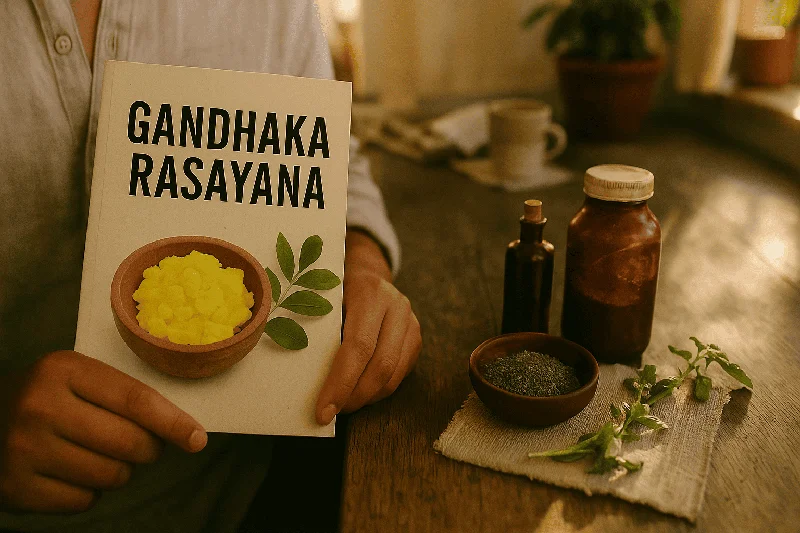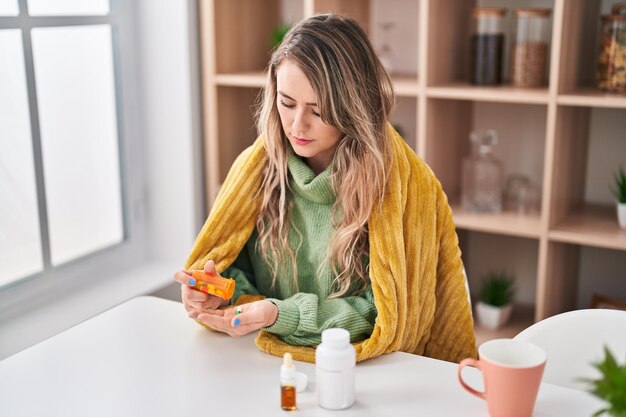Ask Ayurvedic doctor a question and get a consultation online on the problem of your concern in a free or paid mode. More than 2,000 experienced doctors work and wait for your questions on our site and help users to solve their health problems every day.
Gandhaka Rasayana: Scientific Insights & Health Applications

Disclaimer: The information provided in this article is for educational purposes only. It is not intended to replace professional medical advice, diagnosis, or treatment. Always consult a qualified healthcare provider before starting any new treatment or supplement.
Introduction
According to certain Ayurvedic traditions, sulfur holds a place of high regard for its purported detoxifying and revitalizing effects. One formulation that has stood out in classical Ayurvedic texts is Gandhaka Rasayana, commonly known as a sulfur-based rejuvenator. Modern interest in Gandhaka Rasayana has grown as people seek holistic, complementary therapies that integrate ancient wisdom with contemporary research. For anyone looking to expand their therapeutic repertoire or simply learn more about natural healthcare, Gandhaka Rasayana offers a fascinating case study.
This article delves into the scientific aspects of Gandhaka Rasayana, its proposed mechanisms, and the current state of research. We will provide an evidence-based perspective by referencing peer-reviewed studies and recognized medical institutions where available. In addition, you will find practical tips and safety guidelines that help you decide if this traditional remedy might be suitable for your unique needs.
Don't wait or self medicate. Start chat with Doctor NOW
What Is Gandhaka Rasayana?
The Ayurvedic Context
Gandhaka Rasayana is a classic preparation mentioned in Rasashastra, a specialized branch of Ayurveda dealing with the therapeutic usage of metals and minerals. The word “Gandhaka” translates to sulfur, while “Rasayana” generally refers to rejuvenating therapies aimed at promoting vitality, longevity, and overall well-being.
In traditional Ayurvedic lore, sulfur is considered a potent substance for:
-
Balancing Doshas: Particularly beneficial in certain imbalances of Vata, Pitta, or Kapha.
-
Detoxification: Believed to support the body’s natural cleansing processes.
-
Rejuvenation: Aims to renew the body at the cellular level by enhancing tissue quality.
Key Components
Although sulfur is the major mineral in Gandhaka Rasayana, various herbs and adjuncts are added to refine its efficacy and reduce potential toxicity. Typical ingredients can include:
-
Purified sulfur (Gandhaka)
-
Herbal juices or decoctions (e.g., from plants like Triphala or Guduchi)
-
Honey, ghee, and other carriers to improve absorption
These components are meticulously processed and combined to create a homogenous, semi-solid formulation.
Scientific Foundations and Mechanisms
Biochemical Role of Sulfur
Sulfur is a critical element in various biological functions. It is present in some of the essential amino acids, such as methionine and cysteine, which are foundational to proteins in the human body. The significance of sulfur extends to:
-
Detoxification Pathways: Sulfur-containing compounds support liver function in processes like glutathione production.
-
Antioxidant Defense: Sulfur is integral to the antioxidant glutathione, which helps counteract oxidative stress.
-
Collagen Synthesis: Sulfur is vital for maintaining skin elasticity, joint health, and connective tissue integrity.
Ayurvedic Synergy
In Ayurveda, sulfur is thought to acquire Rasayana properties when purified and processed with specific herbal extracts. This synergy is believed to enhance:
-
Bioavailability: Herb-sulfur combinations may increase nutrient absorption and utilization at the cellular level.
-
Immunomodulation: Some Ayurvedic practitioners suggest that Gandhaka Rasayana supports a balanced immune response by regulating inflammatory pathways.
-
Adaptogenic Effects: The herbal matrix may help the body adapt to various stressors, although more clinical data is needed to confirm this.
Potential Health Benefits of Gandhaka Rasayana
-
Skin Health
-
Traditional Claim: Used for conditions like eczema, acne, and psoriasis, owing to sulfur’s antimicrobial and keratolytic effects.
-
Modern Perspective: Sulfur-based treatments are well-documented in dermatology. While Gandhaka Rasayana has not been extensively studied in large-scale clinical trials, smaller observational studies suggest potential benefits in managing mild to moderate skin issues.
-
-
Digestive Support
-
Traditional Claim: Believed to strengthen the digestive fire (Agni) and help in nutrient assimilation.
-
Scientific Possibility: Some sulfur-containing compounds in the body aid digestion and metabolism. More in-depth clinical research is required to confirm how Gandhaka Rasayana specifically affects gastrointestinal function.
-
-
Immunity and Overall Vitality
-
Traditional Claim: Considered a Rasayana or rejuvenator, thus supporting overall wellness and disease resistance.
-
Scientific Insight: Immunomodulatory effects of sulfur compounds have been studied in various contexts. While direct evidence on Gandhaka Rasayana is limited, preliminary lab-based studies indicate antioxidant and antibacterial properties.
-
-
Joint and Connective Tissue
-
Traditional Claim: Used to maintain flexibility and lubrication in joints.
-
Modern Perspective: Sulfur is a key element in glycosaminoglycans and proteoglycans, which are essential for joint health. Integrative practitioners occasionally recommend sulfur-based supplements (like MSM) for joint complaints, suggesting that Gandhaka Rasayana might offer similar support.
-
Current Research Findings
Despite Gandhaka Rasayana’s long history, high-quality clinical data remains relatively scarce. However, several peer-reviewed studies and reviews in Ayurvedic and integrative medicine journals provide early insights:
-
A 2020 pilot study published in an Ayurvedic research journal indicated that Gandhaka Rasayana could potentially alleviate mild dermatitis symptoms. Participants showed improvements in skin hydration and a reduction in redness after eight weeks. Larger, controlled trials are necessary for validation.
-
A systematic review (2018) in an alternative medicine journal mentioned sulfur-based Ayurvedic formulations for their antimicrobial properties, emphasizing that more robust, randomized clinical trials are required.
-
Laboratory studies exploring the biochemical pathways of purified sulfur have pointed towards anti-inflammatory and immune-regulating effects. These findings warrant clinical investigations specifically targeting Gandhaka Rasayana.
While these preliminary results are promising, the consensus among experts is that further placebo-controlled studieswith larger sample sizes are needed to firmly establish the efficacy and safety profile of Gandhaka Rasayana.
Usage, Dosage, and Safety Measures
Traditional Guidelines
In classical Ayurveda, the dosage and administration of Gandhaka Rasayana can vary depending on individual factors, such as Prakruti (body constitution), age, and the condition being treated. Typically, the formulation is administered in small quantities—often between 250 mg to 500 mg once or twice daily—under professional supervision.
Modern Considerations
-
Quality Control
-
Look for GMP-certified or reputable Ayurvedic pharmaceutical companies that follow standardized purification processes.
-
Obtain a certificate of analysis if possible, ensuring the product is free from heavy metals and contaminants.
-
-
Professional Supervision
-
Self-prescribing Gandhaka Rasayana is discouraged due to sulfur’s potency.
-
Consult an Ayurvedic practitioner or an integrative healthcare provider who can monitor your response and adjust doses as needed.
-
-
Potential Side Effects
-
Some individuals may experience gastrointestinal distress or mild allergic reactions.
-
Rare but possible interactions with medications—especially drugs that affect liver enzymes—warrant caution.
-
-
Contraindications
-
Pregnant or nursing women should consult their healthcare provider before use.
-
People with known sulfur allergies or severe liver or kidney conditions should exercise extreme caution or avoid use altogether.
-
Debates and Controversies
Lack of Large-Scale Clinical Trials
Critics point out the paucity of robust clinical data for Gandhaka Rasayana, noting that existing studies often have small sample sizes or lack rigorous controls. This leaves many questions unanswered about its long-term safety and specific mechanisms of action.
Regulatory Landscape
While the World Health Organization (WHO) has guidelines for traditional and complementary medicines, there is no uniform international regulation for Ayurvedic products. Quality can vary, causing skepticism among conventional medical professionals. Efforts by Indian regulatory authorities and global bodies are ongoing to improve standardizationand ensure consumer safety.
Potential Overhype
Some marketing materials tout Gandhaka Rasayana as a “miracle cure” for diverse conditions. This overselling can undermine scientific credibility and lead consumers to try it without appropriate clinical oversight. Responsible practitioners advocate a balanced approach, recognizing the formulation’s promise while calling for cautious optimismand more scientific inquiry.
Frequently Asked Questions (FAQ)
1. Is Gandhaka Rasayana safe for long-term use?
Short-term use under professional guidance is generally considered safe. However, well-designed long-term studies are limited. Always consult a qualified healthcare provider for personalized advice.
2. Can Gandhaka Rasayana treat severe skin conditions like psoriasis?
Preliminary research and anecdotal evidence suggest potential benefits for skin health, but it should not replace conventional treatments for severe conditions. It’s best used as a complementary approach under medical supervision.
3. Are there any dietary restrictions while taking Gandhaka Rasayana?
Ayurvedic practitioners often recommend a balanced, easily digestible diet to optimize the effects of Rasayana therapies. Specific guidelines may vary based on individual constitution.
4. How does it differ from other sulfur supplements like MSM?
While both are sulfur-based, Gandhaka Rasayana is processed with various herbs and undergoes specific purification techniques according to Ayurvedic texts. MSM is typically a chemically isolated form of sulfur.
5. Where can I find peer-reviewed research on Gandhaka Rasayana?
Search reputable databases such as PubMed, or consult journals specializing in Ayurvedic and integrative medicine. Some institutions, like the All India Institute of Ayurveda (AIIA), also publish relevant research.
Practical Tips for Real-World Use
-
Consult First: Talk to an experienced Ayurvedic practitioner if you are interested in trying Gandhaka Rasayana. They can tailor a dosage plan and monitor your progress.
-
Monitor for Reactions: Keep a journal of any changes you notice, whether skin-related or general well-being, and report them to your healthcare provider.
-
Lifestyle Matters: Combine its use with a holistic lifestyle—balanced diet, regular exercise, and adequate sleep—to maximize potential benefits.
-
Stay Informed: Periodically review emerging research to stay updated on safety guidelines and recommended best practices.
Conclusion
Gandhaka Rasayana represents a rich confluence of traditional Ayurvedic wisdom and evolving scientific inquiry. While sulfur’s importance in human biology is well-established, the specific health benefits and safety profiles of Gandhaka Rasayana require further high-quality clinical trials for definitive conclusions. Preliminary research points to potential advantages in skin health, immunity, and overall vitality, but a careful, evidence-based approach is imperative.
For healthcare professionals and patients alike, understanding both the promise and the limitations of Gandhaka Rasayana is key. If you are considering this formulation, consult an expert, adhere to high-quality sourcing, and remain mindful of any regulatory guidelines in your region. By doing so, you stand to gain from a centuries-old tradition while maintaining the safeguards of modern medicine.
Call to Action
Found this article helpful? Share it with others who might benefit from this information! Feel free to leave a commentbelow with your thoughts, experiences, or questions about Gandhaka Rasayana. For more articles on holistic and integrative medicine, subscribe to our newsletter and stay updated.
Disclaimer: This article is intended for informational purposes only and is not a substitute for professional medical advice. Please consult a licensed healthcare provider for personalized recommendations.




